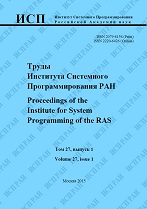|
Toward construction of a modular model of distributed intelligence
Yu. L. Slovokhotovab, I. S. Neretinc
a Lomonosov Moscow State University
b Institute of Organoelement Compounds, Russian Academy of Sciences
c Rock Flow Dynamics
Abstract:
Multi-agent social systems (MASS) in general are systems of autonomous interdependent agents each pursuing its own goals interacting with other agents and environment. Dynamics of MASS cannot be adequately modeled by the methods borrowed from statistical physics since these methods do not reflect the main feature of social systems, viz. their ability to percept, process and use the external information. This important quality of distributed (“swarm”) intelligence has to be directly taken into account in a correct theoretical description of social systems. However, discussion of distributed intelligence (DI) in the literature is mostly restricted to distributed tasks, information exchange and aggregated judgment - i.e. to ‘sum’ or ‘average’ of independent intellectual activities. This approach ignores empirically well-known option of a ‘collective insight’ in a group as a special demonstration of MASS's DI . It this paper, a state of art in modeling social systems and studies of intelligence per se are briefly characterized, and a new modular model of intelligence is suggested. The model allows to reproduce the most important result of intellectual activity, i.e. creation of new information, which is not reflected in the contemporary theoretical schemes (e.g. neural networks). Using the “modular” approach, a correspondence between individual intelligence and DI of MASS is discussed, and prospective directions for future studies are suggested. Efficiency of DI was estimated numerically by computer simulations of a simple system of agents with variable kinematic parameters {ki}, moving through a pathway with obstacles. Selection of fast agents with ‘positive mutation’ of parameters gives ca. 20% reduction of average passing time after 200-300 cycles and creates a swarm movement where agents follow a leader and cooperatively avoid obstacles.
Keywords:
multi-agent social systems, swarm intelligence, models of intelligence.
Citation:
Yu. L. Slovokhotov, I. S. Neretin, “Toward construction of a modular model of distributed intelligence”, Proceedings of ISP RAS, 30:3 (2018), 341–362
Linking options:
https://www.mathnet.ru/eng/tisp343 https://www.mathnet.ru/eng/tisp/v30/i3/p341
|

| Statistics & downloads: |
| Abstract page: | 224 | | Full-text PDF : | 104 | | References: | 37 |
|




 Contact us:
Contact us: Terms of Use
Terms of Use
 Registration to the website
Registration to the website Logotypes
Logotypes








 Citation in format
Citation in format 